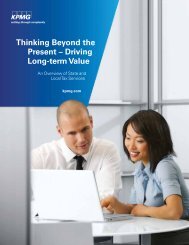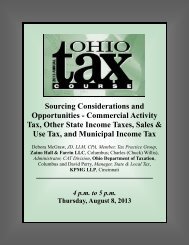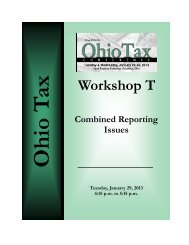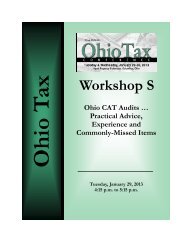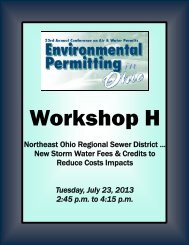Ohio Tax - Manufacturers' Education Council
Ohio Tax - Manufacturers' Education Council
Ohio Tax - Manufacturers' Education Council
You also want an ePaper? Increase the reach of your titles
YUMPU automatically turns print PDFs into web optimized ePapers that Google loves.
2011 <strong>Ohio</strong> <strong>Tax</strong> Conference<br />
<strong>Ohio</strong> Commercial Activity <strong>Tax</strong> (CAT) Audit Experiences<br />
Appendix A<br />
stay, DEF pays the hotel or the franchisee. The amounts received by DEF were determined to be<br />
taxable gross receipts (without reduction for the amounts paid out by DEF).<br />
17. Payroll cost reimbursement for managed property<br />
The taxpayer (a hotel franchisor) franchises hotels to third parties. As part of the franchise<br />
agreement the taxpayer can provide hotel management services (including providing employees<br />
to manage the hotel) to the franchisee. The taxpayer bills for the management services and<br />
separately states the employees’ payroll costs as part of the charge. The Department determined<br />
that the amounts received by the taxpayer for the payroll costs were taxable gross receipts.<br />
18. Warranty repair<br />
The taxpayer purchases trucks that it uses in its business. The taxpayer needs to have the trucks<br />
on the road as much as possible and purchases spare parts that it anticipates will break. The<br />
taxpayer has worked out a deal with the truck manufacturer to repair the trucks when the trucks<br />
are under warranty. The taxpayer bills the manufacturer for the labor it incurred to make the<br />
repair and for the part it uses to repair the truck. The manufacturer sends cash back to the<br />
taxpayer for the labor charge and a replacement part for the spare part used in the repair. The<br />
Department determined that the amounts received for the labor are taxable gross receipts.<br />
Because the part was under warranty, the value of the part was not determined to be a taxable<br />
gross receipt.<br />
19. Chargeback<br />
There is a process in the pharmaceutical industry called the chargeback. The parties involved in<br />
this are the manufacturer, the wholesaler, a group purchasing organization (also known as a<br />
buying group), and the buyer. The buyer, such as a hospital or a drugstore, may join a group<br />
purchasing organization (GPO) to negotiate a better price for purchasing large volumes of drug<br />
products. The GPO negotiates with manufacturers to obtain the best contract prices for its<br />
members. A typical drug manufacturer may have to negotiate thousands of contracts per year<br />
with hundreds of different GPOs. These GPOs may contain over 100,000 individual members.<br />
To simplify the distribution of their drug products, manufacturers also negotiate selling drug<br />
products in large quantities to wholesalers at specified catalog prices. The wholesalers then stock<br />
their multiple distribution centers with the drug products.<br />
Buyers purchase the drug products from wholesalers at the agreed GPO contract prices. The<br />
chargebacks occur when the wholesaler sells the drug products at a contract price lower than what<br />
it paid. The chargeback is the difference between the manufacturer's price to the wholesaler and<br />
the contract price to the customer. The wholesaler will submit a chargeback request to the<br />
manufacturer on a regular basis (daily or weekly). Each chargeback request may contain<br />
thousands of line items for review.<br />
10




